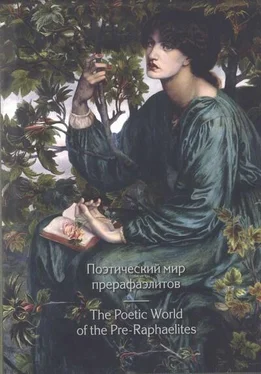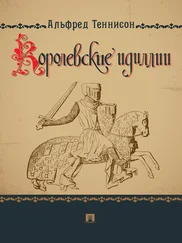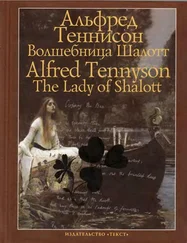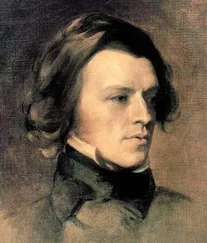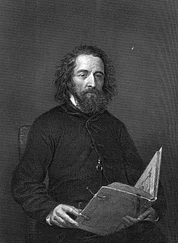The rose and poppy are her flowers; for where
Is he not found, O Lilith, whom shed scent
And soft-shed kisses and soft sleep shall snare?
Lo! as that youth’s eyes burned at thine, so went
Thy spell through him, and left his straight neck bent
And round his heart one strangling golden hair.

Dante Gabriel Rossetti LADY LILITH Oil on canvas. 1868 Delaware Art Museum Wilmington, DE
Данте Габриэль Россетти ЛЕДИ ЛИЛИТ Холст, масло. 1868 Делавэрский художественный музей Уилмингтон, Делавэр
LXXVIII
КРАСОТА ТЕЛА
(ЛИЛИТ)
Лилит-колдунья, первая жена,
Что праотцу Господь позволил взять,
Как сатана, умела сладко лгать.
Текла огнем волос ее волна.
Мир постарел — волшебница юна;
Влечет ее чарующая стать
Мужчин к тенетам радужным — и глядь,
Душой и телом жертва пленена.
Красны, как кровь, колдуньины цветы.
Нет храбрецов, которых дивный сад
Не соблазнил виденьем красоты.
Вот юноша; глаза его горят,
Склонился он, тобой навек заклят,
Удавкой локон обернула ты.
Перевод В. Сергеевой
Once more the changed year’s turning wheel returns:
And as a girl sails balanced in the wind,
And now before and now again behind
Stoops as it swoops, with cheek that laughs and burns, —
So Spring comes merrily towards me here, but earns
No answering smile from me, whose life is twin’d
With the dead boughs that winter still must bind,
And whom to-day the Spring no more concerns.
Behold, this crocus is a withering flame;
This snowdrop, snow; this apple-blossom’s part
To breed the fruit that breeds the serpent’s art.
Nay, for these Spring-flowers, turn thy face from them,
Nor stay till on the year’s last lily-stem
The white cup shrivels round the golden heart.
Кружится быстро колесо времен;
И словно девочка на карусели,
Вся устремясь к какой-то дивной цели,
Летит, смеясь, — и ветер ей вдогон! —
Весна мне мчит навстречу; но, смущен,
Молчу в ответ; томят мой дух метели
Прошедших зим, и мне не до веселий —
Остыла кровь среди замерзших крон.
Взгляни: пророчит ландыш о снегах,
Цвет яблоневый, нежно оробелый, —
О Змие, что погубит плод созрелый.
Не радуйся же лилиям в лугах,
Не жди, когда рассыплется во прах
Вкруг сердца золотого венчик белый.
Перевод Г. Кружкова
FROM ‘FIVE ENGLISH POETS’
THOMAS CHATTERTON
With Shakspeare’s manhood at a boy’s wild heart, —
Through Hamlet’s doubt to Shakspeare near allied,
And kin to Milton through his Satan’s pride, —
At Death’s sole door he stooped, and craved a dart;
And to the dear new bower of England’s art, —
Even to that shrine Time else had deified,
The unuttered heart that soared against his side, —
Drove the fell point, and smote life’s seals apart.
Thy nested home-loves, noble Chatterton;
The angel-trodden stair thy soul could trace
Up Redcliffe’s spire; and in the world’s armed space
Thy gallant sword-play: — these to many an one
Are sweet for ever; as thy grave unknown
And love-dream of thine unrecorded face.

Henry Wallis CHATTERTON Oil on canvas. 1856 Tate, London
Генри Уоллис ЧАТТЕРТОН Холст, масло. 1856 Галерея Тейт, Лондон
ИЗ ЦИКЛА «ПЯТЬ АНГЛИЙСКИХ ПОЭТОВ»
ТОМАС ЧАТТЕРТОН
Мальчишка сердцем, зрелый муж — умом,
Скорбь Гамлета занявший у Шекспира,
У Мильтона — гордыню Князя Мира,
Сквозь двери Смерти он шагнул в проем.
Английского искусства новый дом,
Священный храм нетленного кумира,
В груди своей, платя бессмертью виру,
Разрушил он, к погибели влеком.
Душой ты помнишь, славный Чаттертон
Витой подъем до Редклиффского шпиля
За ангелами следом; и не ты ли
Вел с миром бой? — им дух наш вдохновлен,
Пусть облик твой в веках не сохранен,
И нет плиты надгробной на могиле.
Перевод С. Лихачевой
The weltering London ways where children weep
And girls whom none call maidens laugh, — strange road
Miring his outward steps, who inly trode
The bright Castalian brink and Latmos’ steep: —
Even such his life’s cross-paths; till deathly deep
He toiled through sands of Lethe; and long pain,
Weary with labour spurned and love found vain,
In dead Rome’s sheltering shadow wrapped his sleep.
O pang-dowered Poet, whose reverberant lips
And heart-strung lyre awoke the Moon’s eclipse, —
Thou whom the daisies glory in growing o’er, —
Their fragrance clings around thy name, not writ
But rumour’d in water, while the fame of it
Along Time’s flood goes echoing evermore.
Среди толпы, где слышен плач детей
И девок визг, его тянулся путь —
Он мог на Латмос мысленно шагнуть,
Где все вокруг и краше, и светлей,
Но с нами шел, пока в расцвете дней
Навек в песках летейских не увяз.
Истерзан, брошен, он оставил нас
И в мертвом Риме канул в мир теней.
Твои напевы, мученик-поэт,
Затмиться заставляли лунный свет.
Надгробие цветами поросло,
Что льнут к нему, заслыша в шуме вод
Звук имени; хвалу тебе поет
Река Времен, погибели назло.
Читать дальше
